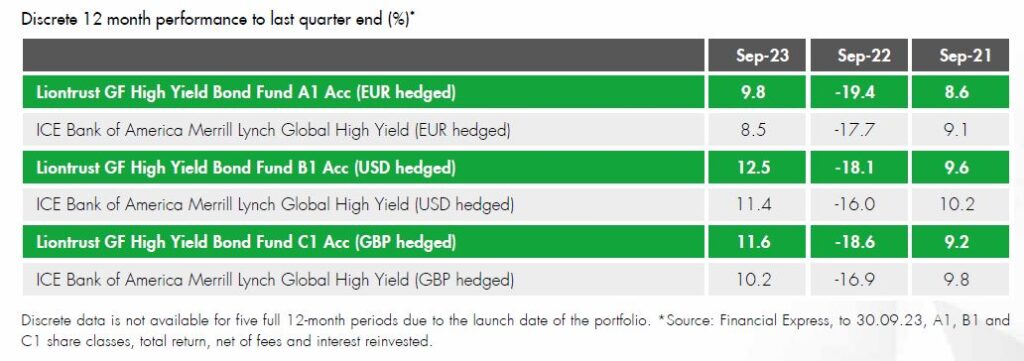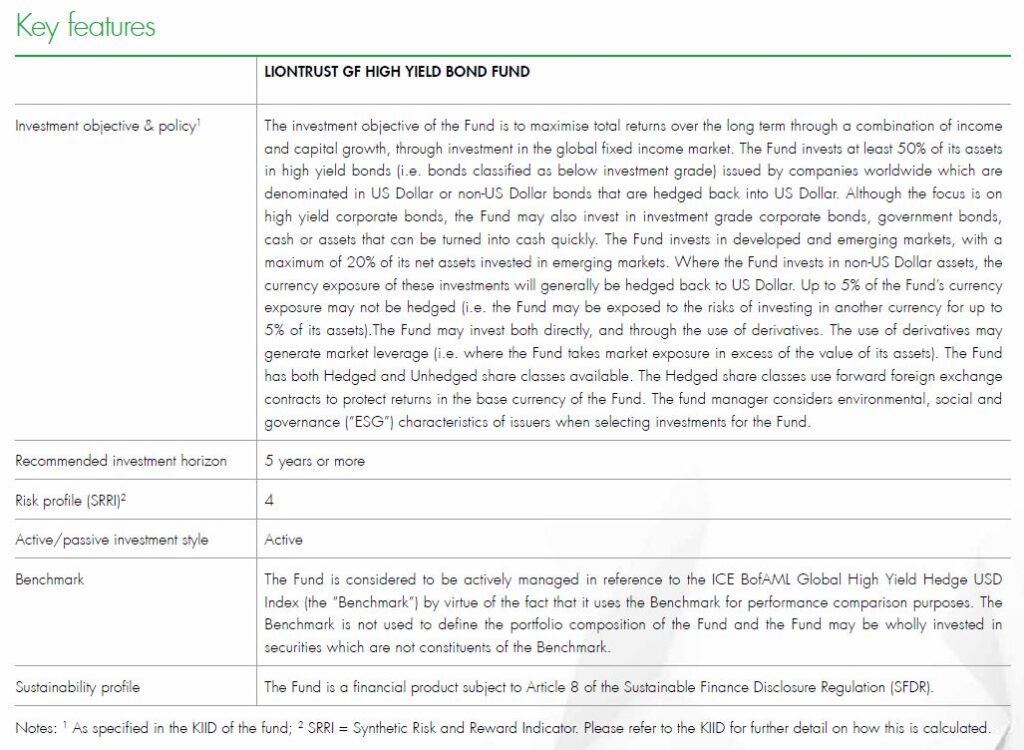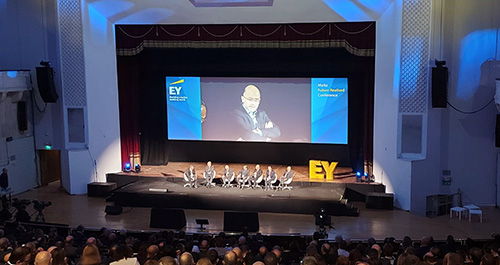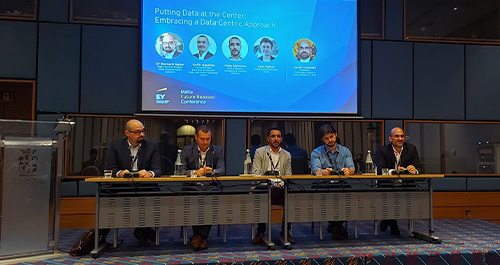Liontrust GF High Yield Bond Fund is manufactured by Liontrust Fund Partners LLP and represented in Malta by MeDirect Bank (Malta) plc.
Market review
The global high yield market returned a positive quarter of 0.9% (USD) in Q3 2023. The US high yield market produced a return of 0.5% (USD) in Q3 2023; in Europe the market returned 2.2% during the period.
The US market saw lower quality bonds outperform higher quality bonds across the last three months with its biggest rally in July. Meanwhile, the European high yield market saw the same pattern, with lower quality bonds outperforming in the quarter, but with the biggest rally from the CCC-rating bucket captured in September. Overall, credits spreads held in well considering the volatile macro backdrop, which is helped by the positive technical of a modest level of primary issuance. The issuance we’ve seen this quarter have been oversubscribed, priced below the initial price talk and have performed relatively well in the secondary market, given the attractive coupon and quality of issuers. We expect credit spreads to remain range bound until there is evidence of fundamental deterioration. The big theme for credit is high-forlonger policy rates, which creates carry opportunities and medium-term refinancing risk that creates fundamental decompression.
Fund review
Relative to index, the best performing sectors in the Fund in Q3 2023 were banking and telecommunications. Other strong contributors to stock picking include Altice International (a telecommunications company) where bonds were supported by the news of management issuing a loan to address near-term debt maturities and asset sales in the pipeline; and Ahlstrom (a producer of speciality sustainable materials) which reported earnings that indicated an improvement in margins on the back of a cost-cutting exercise.
We have built up a bit of liquidity in the Fund, just so we are able to take advantage of any stock opportunities during a market wobble. We have cash parked in short-dated US treasuries and have a long risk CDS index overlay in place (selling default protection on the CDX high yield index) to reduce the drag that comes from holding cash, particularly in a higher yielding environment. This has benefited the Fund by 9bps overall.
Areas where our relative underweight position was a drag to performance was in more cyclical sectors, such as energy. This shouldn’t come as a surprise as the Fund has a bias towards less cyclical defensive credits. Some of our real estate holdings continue to be a drag, namely CPI Property (CEE office, retail and hotels) and Heimstaden (North European residential). Although operationally these companies have performed well, aided by rent indexation, the corporate bond market has gone on buying strike and their bonds continue to drop. Banks have continued to lend and both of these companies have liquidity at least through 2024 and into 2025, but the bond market has not yet been persuaded. Today these bonds offer great upside, but also continued downside risk if the market for their bonds is not fixed in the next one to two years. Together they represent ~1.5% of the fund. Note that it’s not been all bad in the real estate sector, for example, Castellum bonds have been very stable and are up over- 20% in the YTD, boosted by a rights issue in the equity.
Corporate earnings to date have been mixed but on the whole, in line with expectations provided in the previous quarter. Plenty of credits have mentioned customer destocking as a reason for recent soft quarters, but a turnaround is anticipated in the second half of the year. Earnings for Q3 and Q4 will be interesting in terms of seeing whether a positive turnaround can be achieved for those companies without experiencing further hurdles. Cost cutting is a feature for many and in some cases with companies we are invested in, some have proven their resilience through a turbulent economic environment and have a good enough buffer with respect to margins, liquidity and leverage if the turbulence in the market was to persist. Companies that are of lower quality will find it difficult to perform and refinance upcoming maturities if the current backdrop persists or worsens, in which case we would see an uptick in default rates as a result. We haven’t seen many companies struggling to refinance debt as yet but some definitely have a tough road ahead, while some have been reliant on shareholders’ equity contributions to aid their efforts.
During Q3 2023, the Fund participated in five new issues, one of which was Profine, a refinancing of a bond we owned. The company is a manufacturer of PVC profiles for windows and doors and benefits from the tailwind of energy saving solutions. Profine is a solid credit investment in a good business, with a very healthy balance sheet and expectations of a good 2H 2023 in terms of earnings. The 5 year bonds, rated B2/B, issued in July 2023, came with an attractive coupon of 9.375%, making the investment appealing both from a credit standpoint but also in terms of value.
We participated in TriNet, a leading provider of HR and consultancy services to SMBs (small and medium sized businesses) in the US. The company offers services such as HR expertise, payroll services, benefits, risk mitigation, and compliance. We like this HR outsourcing company due to the structural growth in the sector, a $6 billion market capitalisation and low balance sheet leverage which provides a great cushion for any cyclicality in the business. The deal was USD denominated, rated Ba2/BB, unsecured notes with a 7.125% coupon.
One investment grade purchase in the banking space was of BBVA lower tier 2 debt in GBP. We switched out of our holdings into this new issue. The bond has just over a 10-year maturity and is callable after five years. A credit spread of 360bps, to give a coupon of 8.25%, is very attractive.
Coty is a listed beauty company with a leading brand portfolio across names such as Chloe and Gucci, all the way down to high street names such as Rimmel and Max Factor. The company has been performing well, with a portfolio that has proven resilience during a downturn and generated positive FCF. We like the clear path to deleveraging the balance sheet and see potential for the company to be a “rising star” (get upgraded to investment grade) in a few years’ time. We participated in the 5 year, Ba2/BB+ rated (upgraded by S&P to BB+ from BB since investing) with a coupon of 5.75%.
Lastly, Worldpay was the latest new issue we bought. The company is a global merchant acquirer and payment processor. It benefits from reoccurring, transaction-based revenue, which in combination with strong retention rates, support good future revenue visibility. Ongoing secular trends such as the growth of electronic payments and cash displacement underpin Worldpay’s long- term growth potential. We invested in the new 7-year bond in GBP, offering 8.5% coupon – which we think was a steal.
The level of new issues this quarter was relatively lighter than anticipated summer is typically quiet before a surge in issuance over September which really didn’t materialise. The companies that came to market were from higher rated credits, partially demonstrating the appetite for better quality credit among investors but also demonstrating the types of companies that were comfortable enough to refinance in a market where they would be paying a higher interest cost than they were previously on the debt they redeemed. Deals were oversubscribed, showing that there is demand for new issues, IPT (initial price talk) always tightened by 25bps or more once priced – also supporting the level of interest in the primary market. The use of proceeds for most of the deals was for refinancing debt, this quarter the level of secured debt issued was lower than last quarter, overall making it an even split in terms of secured vs. unsecured issues year-to-date.
Outlook
There is market volatility, a ‘higher for longer’ interest rate environment, and economic data releases showing signs of a slowdown – however, inflation continues to be sticky overall. We are seeing credit spreads holding in well in this environment, with lower-quality bonds outperforming. Part of the reason for this is that BB-rated bonds are typically longer in duration. In the face of a mild recession, which is still our central case, we would expect lower-quality companies to suffer from refinancing difficulties, liquidity buffers being eaten into and cost reductions to only go so far before we start seeing signs of fundamental deterioration. This should result in an increase in default rates.
We are invested in bonds with a high-quality bias, less cyclical and with strong credit metrics to weather a tough economic environment – we believe we are well positioned by making lending decisions based on long-term fundamentals and value, not on short-term market sentiment. The asset class is seeing a re-couponing of the market, where issuers are having to pay a higher coupon to refinance debt previously issued in a low interest rate environment. This in turn means that the running yield on offer is lifted from the higher coupons and provides a significant boost in returns for bond investors in the asset class. The fund is currently offering ~9.2% yield for GBP investors.


Liontrust Key risks & Disclaimers:
Past performance is not a guide to future performance. Do remember that the value of an investment and the income generated from them can fall as well as rise and is not guaranteed, therefore, you may not get back the amount originally invested and potentially risk total loss of capital.
The issue of units/shares in Liontrust Funds may be subject to an initial charge, which will have an impact on the realisable value of the investment, particularly in the short term. Investments should always be considered as long term.
Investment in the GF High Yield Bond Fund involves foreign currencies and may be subject to fluctuations in value due to movements in exchange rates. The value of fixed income securities will fall if the issuer is unable to repay its debt or has its credit rating reduced. Generally, the higher the perceived credit risk of the issuer, the higher the rate of interest. Bond markets may be subject to reduced liquidity. The Fund may invest in emerging markets/soft currencies and in financial derivative instruments, both of which may have the effect of increasing volatility. The Fund may invest in derivatives. The use of derivatives may create leverage or gearing. A relatively small movement in the value of a derivative’s underlying investment may have a larger impact, positive or negative, on the value of a fund than if the underlying investment was held instead.
Issued by Liontrust Fund Partners LLP (2 Savoy Court, London WC2R 0EZ), authorised and regulated in the UK by the Financial Conduct Authority (FRN 518165) to undertake regulated investment business.
This document should not be construed as advice for investment in any product or security mentioned, an offer to buy or sell units/shares of Funds mentioned, or a solicitation to purchase securities in any company or investment product. Examples of stocks are provided for general information only to demonstrate our investment philosophy. It contains information and analysis that is believed to be accurate at the time of publication, but is subject to change without notice. Whilst care has been taken in compiling the content of this document, no representation or warranty, express or implied, is made by Liontrust as to its accuracy or completeness, including for external sources (which may have been used) which have not been verified. It should not be copied, faxed, reproduced, divulged or distributed, in whole or in part, without the express written consent of Liontrust. Always research your own investments and (if you are not a professional or a financial adviser) consult suitability with a regulated financial adviser before investing.
MeDirect Disclaimers:
This information has been accurately reproduced, as received from Liontrust Fund Partners LLP. No information has been omitted which would render the reproduced information inaccurate or misleading. This information is being distributed by MeDirect Bank (Malta) plc to its customers. The information contained in this document is for general information purposes only and is not intended to provide legal or other professional advice nor does it commit MeDirect Bank (Malta) plc to any obligation whatsoever. The information available in this document is not intended to be a suggestion, recommendation or solicitation to buy, hold or sell, any securities and is not guaranteed as to accuracy or completeness.
The financial instruments discussed in the document may not be suitable for all investors and investors must make their own informed decisions and seek their own advice regarding the appropriateness of investing in financial instruments or implementing strategies discussed herein.
If you invest in this product you may lose some or all of the money you invest. The value of your investment may go down as well as up. A commission or sales fee may be charged at the time of the initial purchase for an investment. Any income you get from this investment may go down as well as up. This product may be affected by changes in currency exchange rate movements thereby affecting your investment return therefrom. The performance figures quoted refer to the past and past performance is not a guarantee of future performance or a reliable guide to future performance. Any decision to invest should always be based upon the details contained in the Prospectus and Key Information Document (KID), which may be obtained from MeDirect Bank (Malta) plc.




